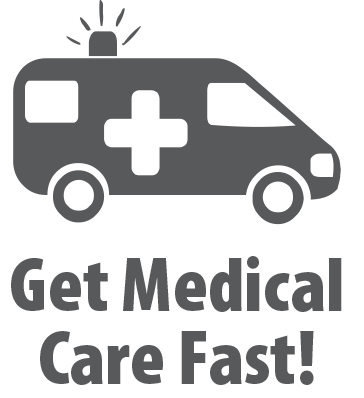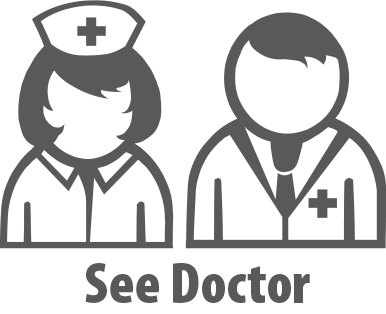Women's Health
Ovarian Cysts & Cancer
The ovaries are two almond-sized organs. One is found on each side of the uterus. Growths called cysts or tumors can form in, on, or near the ovaries.
Cysts are sacs filled with fluid or semisolid matter. Ovarian cysts are common in women before menopause. Rarely are these cysts cancer.
Tumors are solid masses. Most often, tumors in the ovary are benign. Malignant tumors are ovarian cancer. This type of cancer occurs most often between the ages of 50 and 75. It can occur at other ages, too.
Signs & Symptoms
For Ovarian Cysts
When symptoms occur, they include:
• A feeling of fullness or swelling of the abdomen.
• Weight gain.
• A dull, constant ache on either or both sides of the pelvis.
• Pain during sex.
• Delayed, irregular, or painful periods.
• Growth of facial hair.
• A cyst that bleeds, breaks, or twists can cause sharp, severe abdominal pain, fever, and vomiting.
For Ovarian Cancer
In many cases, the cancer has spread by the time it is found. When symptoms appear, they are vague problems and are often ignored. These symptoms, even in early-stage ovarian cancer, last almost daily for more than a few weeks:
• Bloating.
• Pain in the abdomen or pelvis.
• Difficulty eating or feeling full quickly.
• Urgent need to pass urine or passing urine often.
Other symptoms can include:
• Back pain. Pain with intercourse.
• Constipation. Indigestion.
• Fatigue.
• Menstrual irregularities.
Causes & Risk Factors
For Ovarian Cysts
• Some cysts are due to normal changes in the ovaries.
• Some cysts result from cell growth. Most of these are benign, but need medical treatment. Examples are:
– Dermoid cysts. These are growths filled with many types of tissue. Examples are fatty material, hair, teeth, bits of bone, and cartilage.
– Polycystic ovaries. These are caused by a buildup of multiple small cysts from hormone problems. Irregular periods, body hair growth, and infertility can result.
{Note: Taking hormones does not cause ovarian cysts.}
Risk Factors for Ovarian Cysts
• Being between the ages of 20 and 35.
• Endometriosis. Pelvic inflammatory disease (PID). The eating disorder bulimia.
• Obesity.
Risk Factors for Ovarian Cancer
• Not having children. Having children at an older age.
• Not ever taking birth control pills.
• Menopause after age 55.
• Family history of ovarian, colon, breast, prostate, or lung cancer.
• Personal history of breast, uterine, colon, or rectal cancer.
• Being Caucasian.
• Increasing age.
Treatment
Growths on ovaries are diagnosed with a pelvic exam and medical tests. Ways to detect growths include yearly pelvic and rectal exams and an ultrasound. No completely reliable test exists for ovarian cancer. A CA-125 blood test can detect the progression of ovarian cancer. It is not a reliable screening test.
For Ovarian Cysts
Treatment depends on the size and type of cyst(s); how severe symptoms are; the woman’s health status; and her desire to have children.
Some cysts resolve without any treatment in 1 to 2 months. For others, hormones in birth control pills may suppress the cyst. Sometimes, surgery may be needed to remove it. The ovary and fallopian tube may need to be removed, too.
For Ovarian Cancer
The sooner the cancer is found and treated, the better the chance for recovery. Treatment includes:
• Surgery. The ovaries, uterus, and fallopian tubes are removed. If the cancer has spread, the surgeon removes as much of the cancer as possible.
• Chemotherapy.
• Radiation therapy.
• Clinical trials.
Questions to Ask
Question
01
Do you have very severe abdominal pain, a fever, and vomiting?

Get medical care without delay. If symptoms are life threatening go to the ER or call 9-1-1. Don’t call 9-1-1 or use the ER if symptoms do not threaten life. Ask your doctor ahead of time where you should go for a problem that needs prompt care, but not emergency care.
x
Question
02
Do you have signs and symptoms for ovarian cysts or signs and symptoms for ovarian cancer?

You should be seen by your doctor for medical advice. Contact your doctor or health care provider to find out how soon you should be seen.
x
Self-Care / Prevention
For Ovarian Cysts
• Limit caffeine.
• Have regular pelvic exams, as advised by your doctor.
• Take an over-the-counter medicine for pain as directed.
For Ovarian Cancer
• Medical care, not self-care, is needed. Follow your doctor’s advice.
• Ask your doctor for advice if you have a family history of ovarian cancer.
Resources
National Women’s Health Information Center

Download an offline pdf file.
RELATED ARTICLES
<
>
2021 © American Institute for Preventive Medicine - All Rights Reserved. Disclaimer | www.HealthyLife.com








